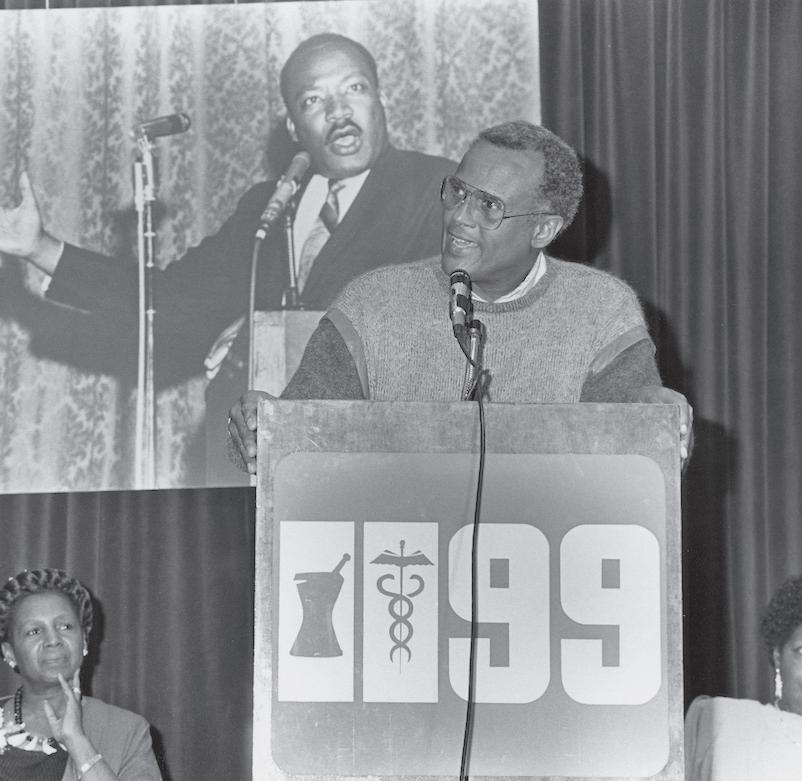
3 minute read
Harry Belafonte, versatile entertainer, civil and human rights activist, dead at 96
By HERB BOYD Special to
the AmNews
Whether on film, in song, at the podium, or on the ramparts, there was an artistic and political consistency in Harry Belafonte’s life. In the tradition of his idol Paul Robeson, Belafonte was unflinching in standing up for the downtrodden, expressing a relentless fight for civil and human rights. That principled life of conviction and speaking truth to power came to an end on Tuesday morning, according to his publicist Ken Sunshine, who said Belafonte died of congestive heart failure. He was 96.

Belafonte first attained worldwide celebrity as a calypso singer, with millions singing along with his version of “Day-O,” a song capturing laborers in banana production, although he was born in Harlem, on March 1, 1927. The popularity of that song in 1956 was just a harbinger of his phenomenal accomplishments, particularly as a singer, actor, and activist.
In 1944, after dropping out of high school, Belafonte enlisted in the US Navy. Perhaps the most rewarding aspect of his military tenure was the number of worldly wise men he met who gave him some lessons on politics, especially the complexities of colonialism, racism, imperialism, and fascism. These encounters proved instructive and forged his contact with militant activists upon his return to civilian life.
“Even though he was known internationally for his voice and his skills as an actor, I knew him as a civil rights activist and personally believe if there was no Harry Belafonte, there would be no Martin Luther King,” said Charles B. Rangel, former representative to Congress and a friend and ally of Harry Belafonte. “He was so dedicated to King and the march from Selma to Montgomery, not only financing but organizing and bringing people to Montgomery, including me, who didn’t intend to march 54 miles but wound up doing it anyway.
“He was able to bring cameras to focus on that march. After Bloody Sunday, which was a few weeks earlier, a lot of people worried the march would be a failure, but Harry was the one who told everybody ‘we have to do it.’”
Rangel concluded, “I met with him at his home recently and he was frail and his voice was weak, but he was talking about the things we had to do to bring this nation past the polarization and hatred that exists. I never found anyone as committed personally to the Civil Rights Movement, even at the expense to his professional career and his family. He was talking about what we have to do next.”
Much of Belafonte’s productive life is captured in his memoir “My Song” with Michael Shnayerson (2011). The hefty tome is split between Belafonte the actor and Belafonte the activist, and even some of his most ardent fans were surprised at just how much of his time, energy, and resources were devoted to civil and human rights struggles.
Belafonte patterned his life and social commitments after his mentor and idol Robeson, rarely ever compromising his artistic and political integrity. In fact, his art and politics were so tightly interwoven that they are as immutably consistent and unimpeachable as they are inseparably linked.

One of the most memorable moments in his life was when he and his lifelong friend Sidney Poitier were couriers during the civil rights days, delivering funds to the embattled Student Nonviolent Coordinating Committee (SNCC) field workers in Mississippi. His connection to the Harlem community resonates in several significant ways, perhaps most incipiently when he was a member of the American Negro Theater, where he and Poitier received early tutelage in stage and screen.
A few years ago, a branch of the New York Public Library (NYPL) was named in his honor, an occasion that he shared with Cicely Tyson. Some of this papers and memora- bilia are housed at the Schomburg Center. It isn’t easy to find one passage that summarizes his steadfast conviction and unwavering commitment to freedom, justice, and equality, but this one may service: “Race was the cutting edge in everything I did,” he said about his role as a Black entertainer. “To let myself be turned into an object of ridicule would undermine not just my stage persona, but my purpose as well.”
The steadfastness and outspokenness Belafonte evinced as a young man continued into the august of his years, even criticizing President Obama and calling President Bush the “greatest terrorist in the world.” He was often unsparing in discussing the need for the younger generation to commit themselves more to voter registration and to take a stand against the rampant police abuse.
Robeson, in his final words as Othello, said he had done the state some service. The same can be said and underscored in the life and legacy of Harry Belafonte.


